The continued evolution of technology is a constant, and every so often a new innovation tends to ‘stick’ and become a part of daily life. Digital literature is a fine example of this, disrupting and supplanting in equal measure the world of print and ink. Many traditional works of literary greatness are now available in eBook form, but authors around the world are also choosing to go digital-only and eschewing paper and ink entirely.
What’s behind this phenomenon, and are eBooks really worth pursuing as a source of revenue, whether it’s full-time authorship, a side-hustle, or even a companion piece to accompany a content business?
This guide will look at the advantages of eBooks, and show you how to sell eBooks online in a handful of key steps.
Have you already started your eBook journey? Click through to jump ahead to:
- Why Sell eBooks Online? Traditional vs. Online Publishing
- How to Sell eBooks Online in 5 Steps
- Selling eBooks Online is Easier Than You Think!
- Start Selling eBooks Online with Whop!
- FAQs
Why Sell eBooks Online? Traditional vs. Online Publishing📚
One of the biggest advantages of selling eBooks online versus going down the traditional publishing route is the accessibility of the digital format. Just about everybody carries a smartphone with them everywhere they go, and any smartphone is eBook-compatible with the right software.
For this reason, eBook authors don’t really need to factor in the proliferation of devices like e-readers since ordinary tablets and smartphones do a great job. And, given how much a part of everyday life these devices are, the addressable market for eBooks becomes extremely broad.
It’s undeniable that there’s a lot of sensory pleasure to be had in leafing through a physical book, especially an aged hardcover, but the sheer convenience offered by ebooks on devices like smartphones is hard to beat. On top of that, production costs are practically eliminated—yes, you still have to write the book and potentially commission cover art, but there’s no printing and paper to think about.
As such, eBooks can be offered to consumers a whole lot cheaper than their traditional counterparts, which is a good thing when it comes to sales—and that’s not to mention the fact that it costs nothing to create eBook copies and you don’t have to worry about things like stock and distribution numbers.
To summarize, these are the main differences between online and traditional publishing in brief:
| Online Publishing (eBooks) | Traditional Publishing | |
|---|---|---|
| Audience | Potentially broader thanks to ready availability of mobile devices | Not as broad as eBooks although some book readers will shun the electronic medium |
| Convenience | Greater since most people don't go anywhere without a mobile device | Slightly less convenient since a book doesn't fit quite as easily into a pocket as a smartphone does |
| Cost | Lower since digital creation is cheap and duplication costs nothing | Higher since printing and supply chain costs have to be factored in |
| Scalability | Infinite | More copies have to be printed and distributed, increasing costs despite economies of scale |
How to Sell eBooks Online in 5 Steps

Now that we’ve demonstrated that eBooks do have several key advantages over the traditional medium, let’s take a deeper look at how you can go about selling your eBooks online!
1. Write Your eBook✍️
Definitely easier said than done, but the first thing you need to do is to start working on your eBook so that you have something to sell. Skip ahead if you’ve already got your manuscript ready to go, but if not buckle up, because here’s a quick crash course!
Pick Your Niche
For starters, the best place to begin is with your niche. This is a big decision and it’s worth taking some time over, because a lot of things about your eBook might be defined by its niche, such as its length, the style you use to write it in, how you market it, and even pricing and profitability.
Some authors know exactly what niche they want to get into, but others may not. If you’re indecisive about your niche, it’s a matter of researching different niches and seeing where your interests and competence lies, as well as what sort of subject might mesh with the style you’re most comfortable with—some niches don’t quite work with some styles, such as self-help books with verbose, flowery prose.
Research is also important when it comes to getting an idea of the market dynamics when it comes to different niches. You’ll learn a lot about what works and what doesn’t, and the realization that sometimes an eBook’s content doesn’t even matter hits hard—if your eBook’s title, cover, length and pricing don’t work for the niche, many consumers just won’t give it a chance.
Structure Your eBook
It’s commonly held that there are two types of writers—architects, and gardeners. George R. R. Martin is one of the most celebrated authors in the world and commonly considered to be the latter, planting the seeds of his story and letting them grow as they will. Architects, on the other hand, are able to outline their book before writing it, and the writing process becomes just a matter of coloring it in.
Even if you’re more of a gardener, deciding on a structure is a good idea when it comes to writing an eBook. An already established author embarking upon their magnum opus may do otherwise, but remember that the time you spend writing your eBook is done so in the hope of future revenue. You don’t want to rush the process, but you do want to finish up in a reasonable amount of time and get the eBook to market—and structure really helps with that.
Structure is also an extremely good thing for the reader in a lot of, if not most niches. Not all eBooks are GRRM-esque works of fiction running into the thousands of pages—your chosen niche might be cooking, or self-help, or finance, or any one of a number of other subjects that would definitely benefit from a well-organized structure.
The length of your eBook is going to play into this and be a derivative of your chosen structure, so remember to think about your word and page counts. To learn more about the ideal length for different eBooks, check out this guide.
The title of your book is going to be a big part of this, too. It’s something that you can save for the end and get plenty of help on, but ultimately the title of your book will play a huge part in whether or not it will sell.
Have Your eBook Edited
One of the most important things to do when you’re done writing your book is to get it proofread or even professionally edited. Not going through this process can be majorly problematic since errors can make their way through to the final product, and then your eBook will start getting negative reviews from readers. Even a few typographical errors can destroy the reading experience of an otherwise engaging eBook.
Running your eBook’s draft through the spell check function of a word processing software is a good first step, but should in no way be the last. There are premium editing software and AI systems you can use too, and these will get you to second base—but again, they aren’t foolproof.
To ensure that your eBook is as polished as it can be, link up with a professional editor—whether a professional service or a freelancer, getting human eyes on your eBook is critical. Let a few people close to you read it too, because feedback from multiple perspectives is a very good thing.
Ultimately, good editing will ensure that your eBook is perfectly polished and gets the message out in the best possible way, and that’s all without losing your voice as an author.
Design Your eBook’s Cover
“Don’t judge a book by its cover” is a famous saying, and it exists purely because a lot of people tend to do just that. You can’t change it, either, so the only real route is to ensure that your eBook’s cover is judged as favorably as possible.
If you’re purely a wordsmith it’s entirely reasonable that you can’t manage the cover design all by yourself. Just like with editing, there are plenty of professionals and freelancers alike who’ll happily do this for you, and there are tools out there to help if you want to try your hand at it first.
A good eBook cover needs to give the reader an idea of what to expect from it, and the research that you did into the niche earlier will help to inform you of what sort of cover design tends to work best.
2. Price Your eBook💲
You’d think eBook pricing is simple, but nothing could be further from the truth. With traditional books there’s always a baseline because you have publishing and printing costs to consider. Then you can simply tack a profit margin on to that, and you have a basic pricing model.
With eBooks, there are far fewer costs to build in, and it’s difficult to factor them in anyway since they’re the same whether you sell one copy or ten million—eBooks are, after all, infinitely reproducible.
So, pricing your eBook tends to come back to the research you did going in, with a few variables added to that. If you’ve got a certain reputation in a niche already or are putting out very specialized information in your eBook, you might be able to charge a lot more than you would otherwise.
Generally though, different niches or genres tend to feature certain price ranges, and you’d do well to work that out. The length of your eBook will also factor in, and readers tend to understand that a longer book might mean a slightly higher price.
The platform you choose to sell your eBook on might also be a consideration in terms of pricing thanks to royalty structures. Amazon’s Kindle, for example, tends to reward price points of around $9.99 and you might actually end up making more money from an eBook at that price than one you price double.
3. Choose a Sales Platform💻
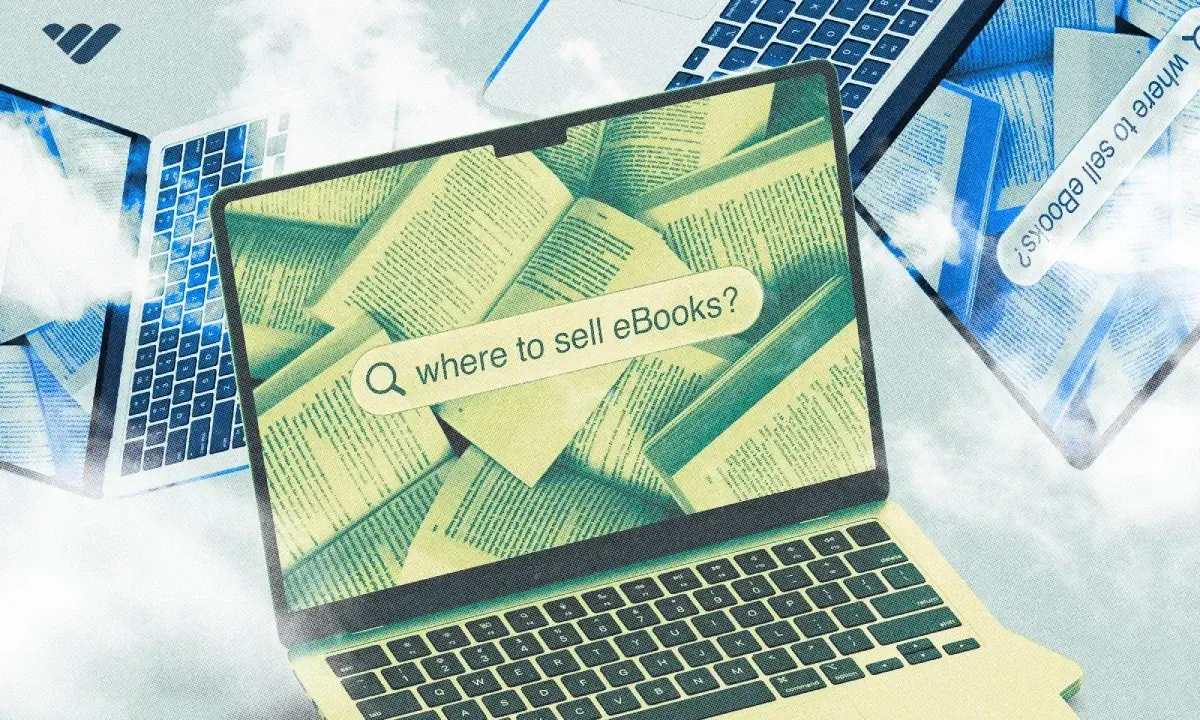
Pricing isn’t the only reason to take the selection of a sales platform seriously, even though it is a big one. Some platforms, such as the aforementioned Amazon Kindle, can give you lots of exposure and far more sales than if you choose to self-promote and distribute yourself.
That being said, listing your eBook on a sales platform like Kindle can be really complicated, so it’s worth taking the time to understand how they work—and especially how things like royalties function. Some of these major platforms are heavily biased toward cheaper priced eBooks, so if you’ve got a highly specialized, premium product, you’ll need to look elsewhere.
Selling your eBook on your own website is an especially attractive option in this regard, but there are plenty of fantastic eBook sales platforms to choose from—here’s a list of our top 15.
Getting yourself set up to sell your eBooks on a sales platform is simple, too. Here’s a quick step-by-step on how to do so, using Whop as an example:
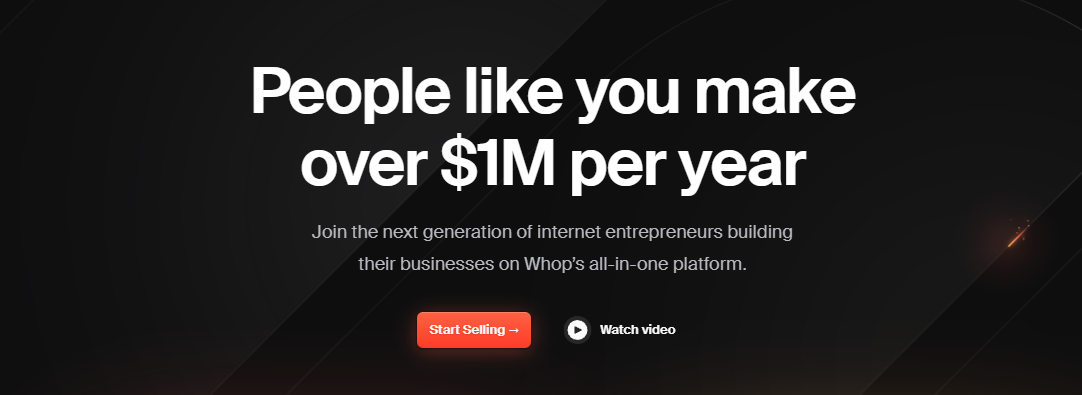
First of all, head to Whop.com and click on Start Selling to get started. Selling an eBook on a platform like Whop is just like any other digital product, and you can use Whop to sell lots of different products from the same store page!
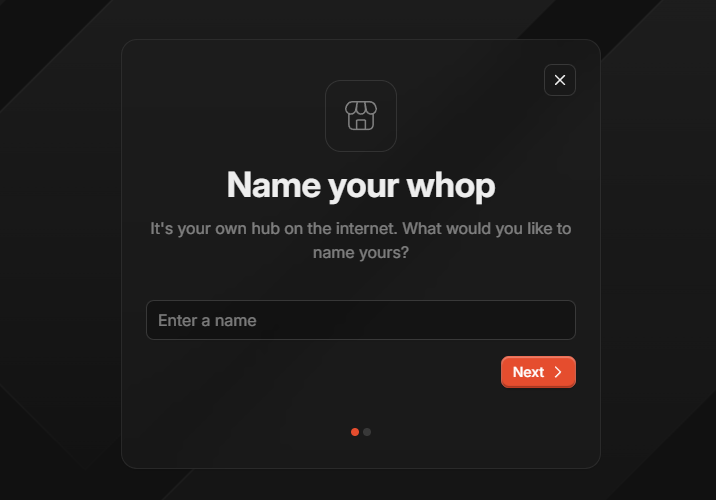
Now simply name your Whop. This could be your name as the author of your eBook, or any sort of business or store handle you’d like to create.
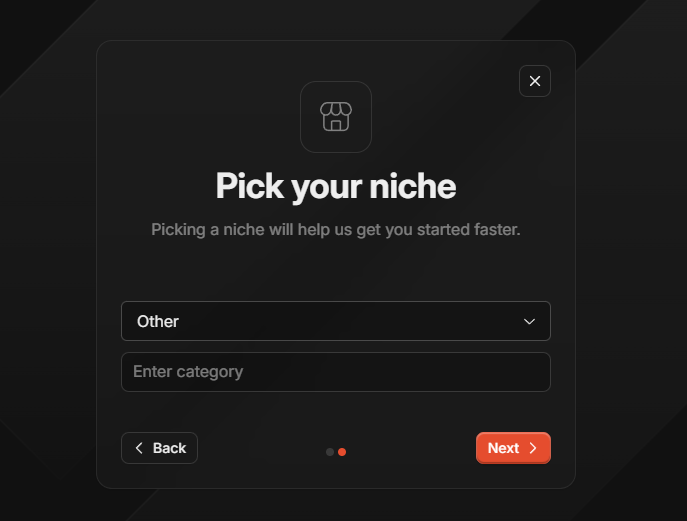
Then pick your niche, using the dropdown box to pick the genre that comes closest to that of your eBook. If you don’t see a close match, go for Other and then specify the category in the text box.
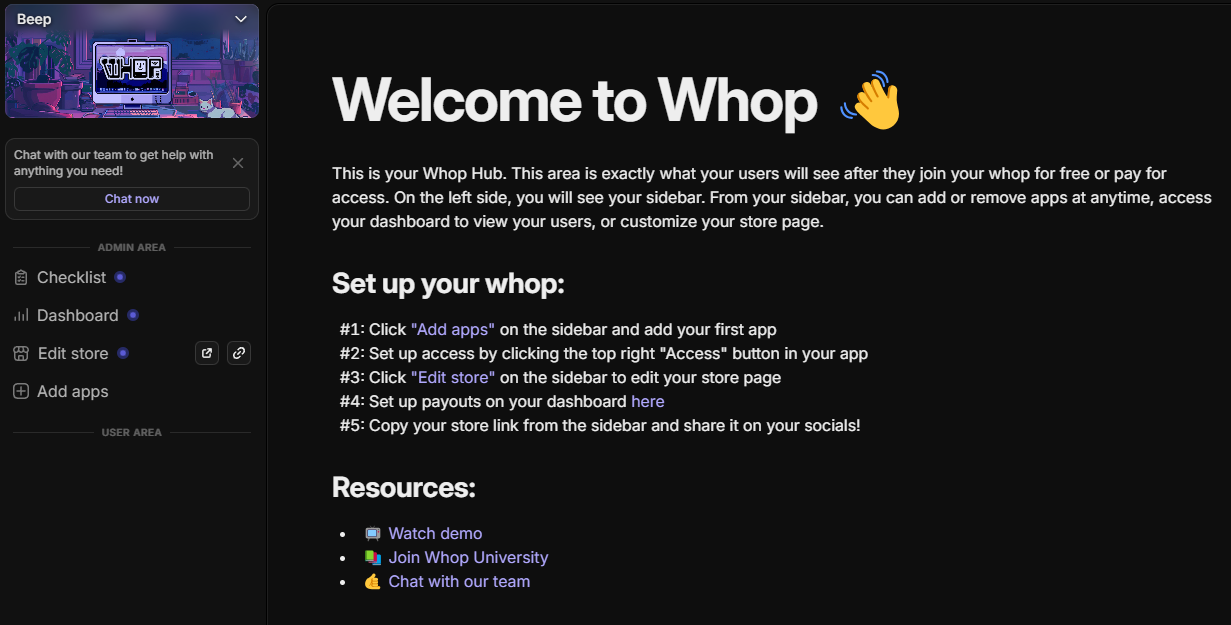
That’s all there is to creating your Whop Hub! From here you can explore the different resources available to you, or just go straight to uploading your eBook. You can edit your store at any time, but once you’re ready to go, hit Add Apps.
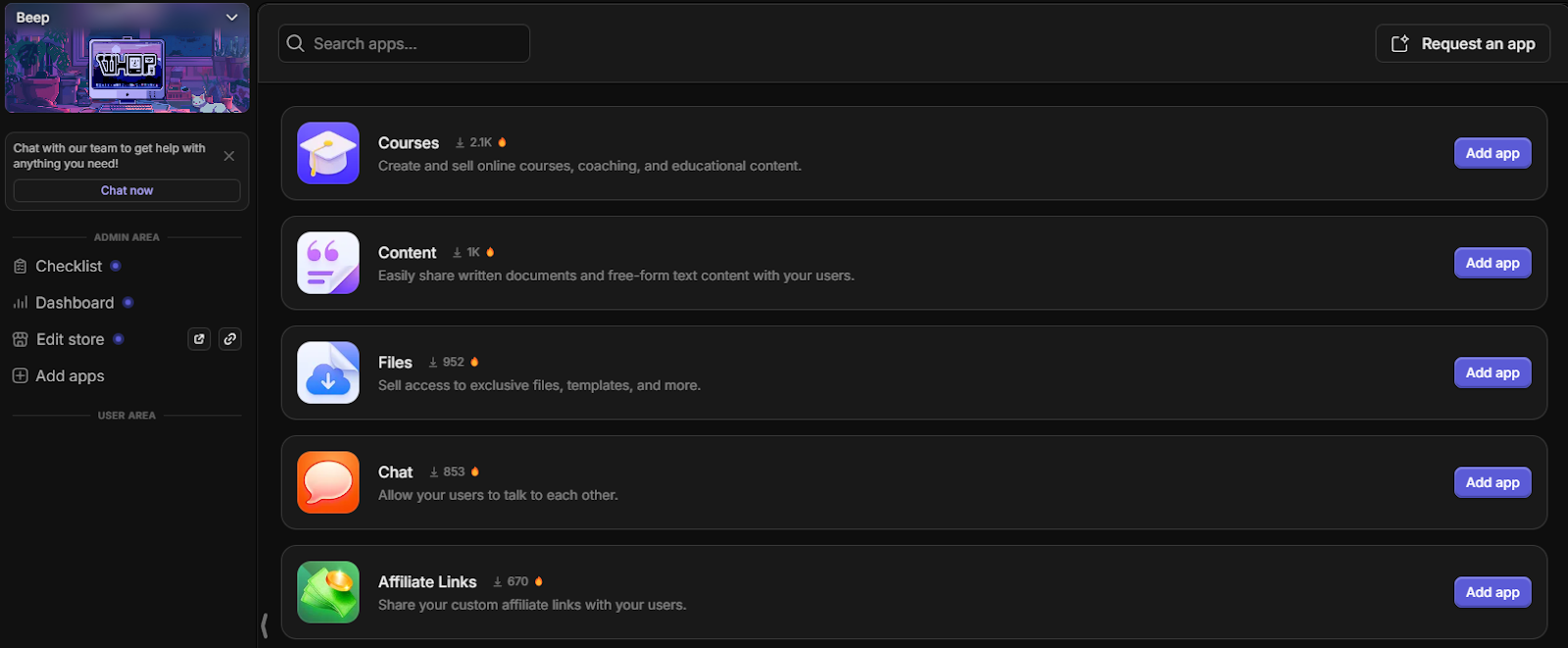
Now simply choose Files. This’ll allow you to sell different types of files, including your eBook formats of choice.

Now just head to the Files section of your user area, and click on the box that says Upload files in the center of the screen to give your eBook to the world!
💡With your Whop hub you can add as many 'apps' as you like. You may want to use your hub as simply a way to sell eBooks, or, you could build a community around these ebooks, selling access to a premium chat for super-fans, PDF coloring pages, live-readings with the video app, and so much more! Your hub is your space on the internet, ready to build as you choose.
4. Market Your eBook🗣
Even with a fantastic, fairly priced eBook now listed on a top sales platform like Whop, your job is far from done—and in fact, you may not be seeing very many sales at all even with these boxes ticked because you still need to get your eBook to the eyes and into the consciousness of your consumers.
Granted, listing on Whop or another platform will help thanks to discoverability, and visitors of those platforms will stumble on your eBook if you label, categorize, and describe it well. However, there’s a whole lot more you can do to market your eBook:
Use social media
Even if you’re not a big user of social media services like Twitter/X, they can be extremely valuable for building awareness about your book. You shouldn’t hesitate in being aggressive with your social media in promoting your book, and building an audience is a good idea even prior to launch.
It’s also a great idea to set up social media accounts as an author to differentiate the content there from whatever your personal accounts have—your friends and family will still give you a few follows on your author profile if they want to get involved, and your own network is always a great starting point. You could even look into influencer marketing to build hype for your eBook!
Know your niche
When you research your niche, you need to make a note of the different sources of influence in the area. Authors used to (and still do) get on TV to promote their books, but it’s a whole lot easier–and cheaper–to go the social media and content route. Link up with YouTube channels in your niche, do AMA’s on niche-related subreddits, write guest posts for blogs that have a following in that genre—this’ll get your name, and that of your book, to the right audience.
Build an email list
Especially in the lead-up to launch, an email list can help you communicate with the people most likely to buy your eBook—and purchase any other content you have to offer, too! It’s a good idea to have an email list (and a website or landing page where people can subscribe to your email newsletter) handy when you’re doing social media or content marketing, too.
Use affiliates
Affiliate marketing is an extremely powerful tool because it allows influencers to cross-pollinate. Why not give people with their audience a small cut of your sales for access to said audience? You can really ramp up your sales this way, and paying up to 50% commission is fine because you wouldn’t have seen those sales otherwise.
Leverage reviews
Another really good way to boost sales that leans on your research of the niche is to send out copies of your eBook to influencers to review. They’ll thank you for the content you’re giving them, and their word will bring members of their audience to your door.
Keep marketing post-launch
You can keep scoring sales months or years after you launch your eBook so it’s worth doing on principle, but with one eBook under your belt, are you going to stop there? The email lists, the affiliates, the contacts, the social media presence and reputation you now have are a ready-made springboard for you to launch your next eBook!
5. Start Selling Your eBook🛍️
With your eBook written, edited and polished, its price set, a sales platform chosen, and pre-launch marketing in place, all that remains is to click that upload button and launch your eBook! Marketing is a never-ending process and you’ll want to coordinate some of that launch hype, so there’s no time to put your feet up—but seeing those sales figures start to turn over should provide ample motivation to keep working!
Continuous marketing will help you keep scoring sales long after launch, and you can now use what you’ve built–and the experience gained, good and bad–to start working on another eBook or digital products to supplement the one you launched.
Selling eBooks Online is Easier Than You Think

Selling eBooks online is a lot of work, but it’s also easier than you think by a long, long way. Most people are intimidated by the very thought and so never even try, but if you follow this guide you’re going to give yourself the best possible chance of becoming an eBook author.
That being said, here are a few tips and tricks if you want to play the eBook game by your own rules!
Selling eBooks Online for Free💸
There are generally three major cost factors when it comes to creating an eBook—the fees levied by your sales platform, and the outlay on professional editing on one hand and cover design on the other.
It’s definitely possible to sell eBooks online for free by cutting all of these costs to zero. You can do the cover design yourself, or use tools like Canva to help you. You can get a significant amount of mileage from the likes of Canva or even Midjourney for free, which means that you don’t have to hire a graphic artist or company to do the job.
In the same manner, you can use a number of AI services to get your editing done on your behalf. Remember to always check the AI’s work—they’re not quite at the level where you can fully trust them just yet, and you don’t want to let software over-edit your work.
Finally, you can choose a sales platform that doesn’t require a fee to list and sell your eBooks. Whop, for instance, offers an industry leading fee schedule of just 3% on any sales you make, meaning that it’s utterly free to use Whop and you get to keep the vast majority of sales revenue—most competitors take a much bigger bite out of your sales.
Selling eBooks as a Side Hustle💼
Just because you want to sell an eBook doesn’t mean that you have to quit your day job to become a full-time author. That may be the dream, but most new authors start by selling eBooks as a side hustle, and slowly build up their revenue from multiple eBooks and related digital products to the point that they can live comfortably off it.
So, the name of the game is to get your eBook launched quickly and effectively, then optimize your marketing. Ideally you want to spend as little time as possible generating sales from your eBook after you launch it, letting it generate passive income for you. As that happens, you can work on your next project—whether that’s another eBook, or something like a course or subscription that can piggyback off the success of your recent launch.
Selling eBooks on Amazon🅰️
Amazon’s Kindle Direct Publishing is one of the top platforms for eBooks, leveraging the sheer reach of Amazon to offer you a wide audience and easy access to readers. This is definitely an option if you don’t want to market your eBooks as aggressively as you might need to if you were going to sell on your own website.
If you want to go the Amazon KDP route, it’s a very good idea to learn how royalties work. There are multiple royalty plans to choose from which then get complicated based on where customers live, so take some time and read and understand what’s going on.
To sell eBooks on Amazon, you’ll have to create an account at Amazon KDP and then choose to “create a new Kindle book”. You can then fill in all of the required information, upload a cover image, choose your royalties and pricing, then upload your formatted eBook.
Amazon also has a preview feature where you can make sure everything’s fine on different Kindle devices and settings, so definitely run through that before you publish. When you do, your eBook will be live within one or two days.
Selling eBooks Without Writing Them👻
It’s not as crazy of an idea as it sounds! It’s absolutely possible to sell eBooks without writing them, but the trick is to get someone–or something– to write the book on your behalf.
There are a lot of freelance writers out there with the skills and expertise to ghostwrite a book for you, so it’s just a matter of finding the right one. Freelancer portals or even subreddits like r/hireawriter are home to plenty of writers, and you can ask to see a portfolio and negotiate a price with one who you think is a match.
At a stretch, you can also conscript AI tools like Jasper or Chat GPT to generate text, but be wary of this one. AI isn’t necessarily known for generating tremendous quality, and it certainly isn’t going to contribute anything new to a discussion—still, if you’re adamant about going down this route, consider giving yourself the role of editor and add as much value as you can.
Start Selling eBooks Online with Whop
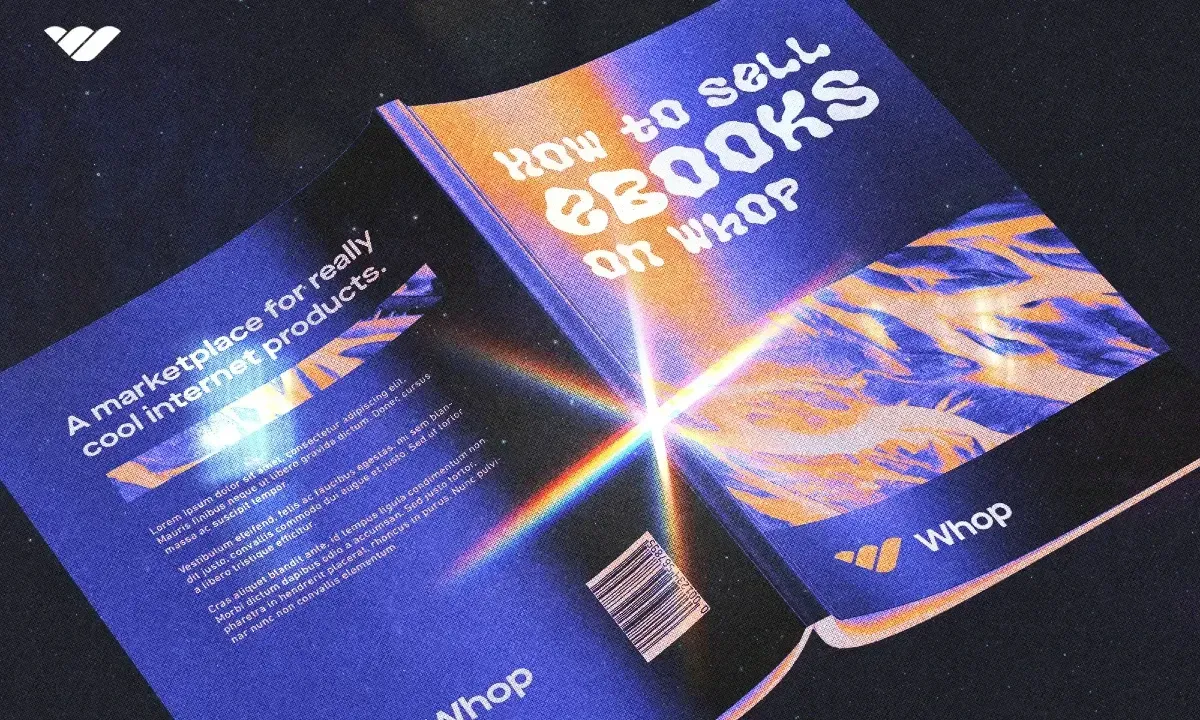
Selling eBooks online isn’t as daunting a prospect as it might appear at first, and you can make your eBook a success if you put the work in with regards to research, niche selection, editing, and marketing. On top of that, you need a sales platform that can take care of the digital fulfillment for you, handling payments and getting copies of your eBooks to readers as fast, efficiently, and safely as possible.
Whop does this better than anyone else on the market, and for a transaction fee of just 3%, meaning that it’s completely free - Whop only makes money when you make money.
You can set up a Whop Hub for zero cost to yourself, and use it as a digital store as well as a community, letting your readers purchase your eBooks but also interact with you and each other. Whop lets you sell courses, memberships, digital files and attachments, and eBooks too—letting you build the perfect revenue network powered by your words.
Check out Whop today, and get in touch with the team or just create a Hub to get started!
FAQs
Can you sell eBooks on your own website?
Yes, you can! You’ll need a little bit of expertise to do so, especially when it comes to the digital fulfillment side of things, but the easiest way to proceed would be to integrate Whop with your site via the Whop API so that everything’s taken care of for you.
How to sell eBooks online with PayPal?
PayPal (and other payment methods) can be used for selling eBooks if your sales platform allows it. Do some research into the different sales platforms and pick one which does business with as many countries and payment networks as possible, and accepts plenty of different currencies.
How much money can you make selling ebooks?
You can make plenty of money selling eBooks, but how much depends on the power of your marketing and what you price your book at. More sales and higher price mean more revenue, but royalties can factor into that too.
What type of eBook sells best?
Genres like fitness, health, self-help, finance, mystery, and romance tend to see the most sales and the widest audiences. That said, don’t be afraid to go niche—books that answer very specific questions can often be the most profitable.





![57 Best Digital Products to Sell [2024]](/blog/content/images/size/w600/2024/02/Best-Digital-Products-to-Sell--2024---1-.webp)